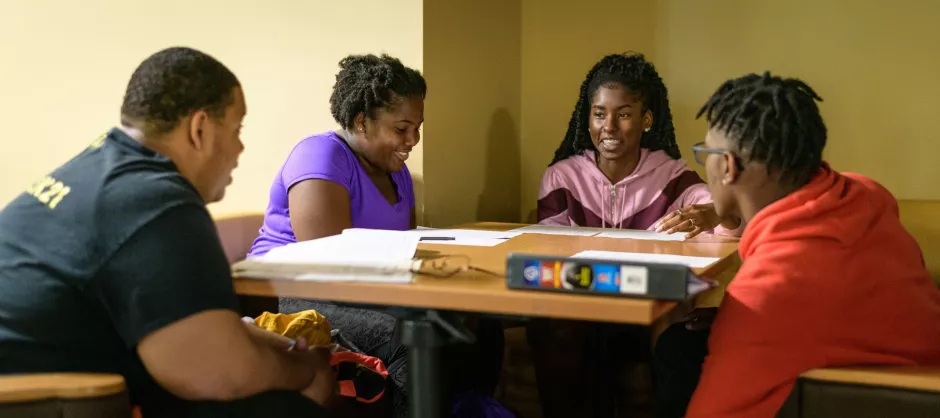
5 Tips for Leading a BCM Small Group
One of the beautiful parts of Black Campus Ministries is the diversity of the African diaspora. As you prepare to lead Black people in your small group, it is important to recognize that Black is not a monolith of people who are primarily African American descendants of slaves. Black Campus Ministries has Black people from the continent and across the African diaspora, which also includes Africans, Afro-Caribbeans, Afro-Latinos, and biracial/multi-racial Black people. Thus, with a diversity of people, ethnicities, and cultures, be prepared to encounter many different backgrounds, upbringings, perspectives, etc. within your small group.
The 5 Tips
1. Make sure to set the atmosphere
First impressions are key. How the leader presents themselves and the vibe of the gathering space are both make-or-break moments for your small group. From the moment participants walk through the door, these things are being assessed. As Black people, we have a tremendous respect for our leaders. So, you want to begin the process of establishing your spiritual authority over the group early.
Consider how you position yourself as the leader through your actions. As participants enter the gathering space, pause what you are doing to say hello, introduce yourself, and let them know you are excited to have them there. If you have handouts and/or instructions about seating or activities, take time to share these items with participants as clusters of people start to form. The vibe of the gathering space should be welcoming and inviting, where upon entry Black students feel seen and safe. If the configuration allows, consider having a mix of gospel music, Christian rap, and African/Caribbean Christian music playing in the background as people enter. Also, prepare some conversation starters to establish expectations for a lot of welcomed interaction and engagement during your time together. In combination with the vibe you are setting, this will help to establish your space as a place for openness and vulnerability.
2. Communicate relevance early
With so much going on in Black communities around the nation and world, for some Black people in our community, faith can feel separate from what is happening in “the real world.” The same can be said when people have a lot of challenges in their personal life; they can be distracted from being present in the here and now, including your small group. Thus, it is helpful to establish relevance for your Bible study at the beginning of the discussion. This might mean acknowledging how the lesson relates to incidents happening in the world or asking an opening question that draws in the personal stories of people present in your group.
Taking this time at the beginning of your study will help participants understand how what is being shared connects with something they can easily relate. It will also help them more deeply engage with the discussion as the study progresses. Do note that this time of establishing relevance should not replace application of the scripture. Both are necessary for Black people to not only receive the material, but also have practical ways to apply what they have learned to their life.
3. Be flexible in the discussion
Black people love to share and tell stories, so make space for a lot of discussion in several different ways. If you alternate between partners/triads, small groups, and large group, this will open an opportunity for everyone who wants to share, to share. Not everyone will want to share in the larger group, but also some people will try to dominate this space. Give space for those dominant voices, but regularly ask for others to nominate some of the softer voices who may need some affirmation from what they shared in the smaller groups.
Tangents will inevitably happen, welcome them, and even plan time in your schedule for them. These tangents often give Black people an opportunity to broaden the views and perspectives of the discussion as people begin to feed off the contagious spark of one another when sharing. Just remember at some point you will have to reel them back in. It is not necessary to directly connect the tangent to the original discussion, but if you do see how things may connect (and they often do), take the time to share this with the group as you prepare for the next part of the discussion.
4. Limit the “Christianese”
For many years, most of the Black students engaged on campus grew up in church and often connected with InterVarsity out of the need for community and a deeper understanding of how to make their faith their own. However, in the last few years, things have shifted to where many Black students encountered are coming from an unchurched background. In fact, several students’ introductions to Christianity might be within InterVarsity. There are also a growing number of skeptics because of how the majority White or Conservative culture have loudly, dominated Christian thought. Therefore, you should prepare for a wide spectrum of Biblical/Christian knowledge within your small group, and this includes what one may consider as basic Christian knowledge.
As you prepare your questions for discussion, try to limit verbiage that assumes everyone in the room knows what you are talking about, such as “we all know the story of…” or “we know the Bible says…” Also, avoid using common Biblical terms alone such a salvation, sanctification, anointing, etc. without also defining the word in the process (e.g., salvation can be defined as being forgiven through Jesus and brought back into relationship with God, or anointing can be defined as an special empowerment by God.)
5. Preach, preacher!
With both the churched and unchurched, Black people have an appreciation for a lasting, impactful word. Thus, it is important to close your time with a strong summarization of everything shared. This closing word does not have to be lengthy, instead as the leader you want to connect the points you prepared to make ahead of time, any strong words received out of the discussion from the students, and anything extra the Holy Spirit might have highlighted for you. Do not focus on trying to have a tweet-able moment; instead, use this summation to bring the entire discussion home. Allowing the Lord to use you in these closing moments provides another cultural opportunity for people to receive whatever the Lord desires as you serve as the vessel of the moment.

